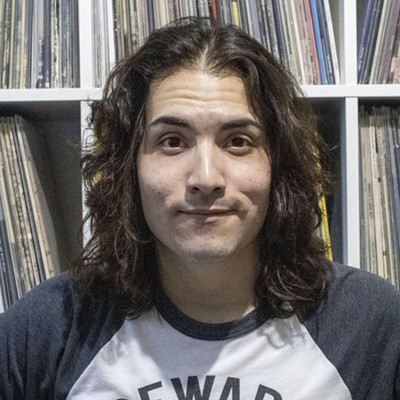“You know what, it does feel like that,” Melchor says laughing. “I want to say I rented the set from Cloverfield as a backdrop, but obviously I don’t want to lie to you.”
Melchor is scheduled to make an appearance at The Kessler Theater alongside adopted Fort Worth singer/songwriter Abraham Alexander on Monday, Nov. 22. Melchor’s disclaimer makes sense; giving a cursory glance at his musical body of work, lying is not something he is used to doing. His songwriting has a sharply personal and intelligent touch, the kind of ideas that flow from his music are the same kind one talks about with a loved one after a long day, except Melchor's are delivered with a wistful delight that most confessional folk music tends to avoid in the Twitter age.
Between the Februarys of 2020 and 2021, Melchor delivered a new song to fans every Sunday in the form of a text message link called the “Melchor Lullaby Hotline” as a way to simply share some of the numerous songs he was writing, all of which were collected to form Melchor’s first solo LP — a "mixtape,” as he calls it — titled Melchor Lullaby Hotline, Vol 1.
“It felt more like a compilation of songs that were already out; there weren’t too many new ones,” Melchor says. “Not to mention the recording quality varies and I wrote them all at different times. Some songs feel like rough demos and others are very lavishly recorded. I want my first album to be this direct, intentional thing, whereas this was not really supposed to be what it was. I was like ‘I should just do this.’
"It felt more like a 12-song EP compilation of the hotline as opposed to a proper album with music videos and a rollout. It felt like a mixtape where things were pieced together and somehow worked.”
One of Melchor’s early songs, “Brook Revisited,” from his debut EP The Archer, opens with the visual line “Have you ever seem someone with dreamcatchers for teeth?” Melchor says that the song was based on a friend of his that was “very good at manifesting” and always seemed to make his dreams come true.
“I once read a Snapple fact that said ‘If you don’t talk about your dreams in five minutes you’ll forget them,’” Melchor says. “And I think that entered my brain as a sixth-grader and just stayed forever. That’s just my truth now, but, corny as it may sound, everything I get to do in real life is like a dream, so if I don’t actually dream that much, I’m not all that upset about it.”
The upcoming show is not Melchor’s first time in Texas; he says that in his travels across the country, he frequents Texas in part to escape the cold and unpredictable weather of the northern United States and feels a special kinship with the state. Melchor has collaborated with North Texas' own model Texan, Allison Ponthier, who shares his penchant for worldly songwriting and compulsive smiling.
“Oh my God, Allison,” Melchor says, with a bit of a swoon. “From the first day I met her, we did a session, and I did not know who she was, but from the second I met her, I was like ‘This person is truly incredible.’”
Their songwriting collaboration has yielded at least two songs so far, both Ponthier’s: “Harshest Critic” and “Faking My Own Death.” Melchor says that if he has a say, those won’t be the last things the two work on together.
“I told my manager, ‘Whatever Allison wants to do, I’m always down to do it. 100%,” Melchor says. “She has turned into one of my best artist friends. She’s really good at describing her feelings, but she also knows exactly what she wants as an artist, which is really inspiring. She’s not of this Earth, just a magical person.”
Melchor’s own approach to songwriting has that magical belief of the-song-chooses-the-writer, but he also says his vessel-type approach is much more work-based.
“I’ll write 100 songs in the hope that five are good,” Melchor says. “The ideas come to you but they can leave you if you don’t write them down right away or chip away at them. Some songs you write in an hour, some take a year. I think it’s all different, I wish they chose me more often, ‘cause most of the time I’m not looking for them.”
The idea of giving birth to a song is such an intimate process that prying into one’s individual manners of songwriting feels almost like peeking in on a private family matter, but according to Melchor, his process is undefined and therefore more comfortable to disclose.
“I think I’m lucky enough to be able to do it on my own, which I guess is how it used to be, and really developing it through a lot of listening,” he says. “I once got into a philosophical discussion with my manager, I was like, ‘If a song isn’t recorded, does it happen?’ Because obviously lots of people write things down, but does it actually occur if it’s not recorded? I do think it goes away if you don’t write it down or actively look for it.”
Aside from his collaboration with Ponthier, Melchor co-writes songs with various songwriters in his travels, having collaborated with musicians like Ethan Gruska and Emily Warren. Warren, most known for writing the uber-hit “New Rules” for Dua Lipa, collaborated with Melchor on a song titled “The Last Song on Earth.”
“She lives right down the street from me [in Los Angeles], and we talk all the time,” Melchor says of Warren. “She and I had dinner one night and she asked me if I was still interested in writing a song. She then started listing off all of these things we talked about over dinner, and I was like, 'How did you remember all of that?’ So, I think the best lines of any song come naturally, like conversation, in the way that she was able to pull out of me.
"She’s been very inspirational in how I work with anybody, really. I just take mental notes as to whatever they’re saying; it’s easy if it’s like a conversation between two people — you just put the best lines down and move from there.”
"Corny as it may sound, everything I get to do in real life is like a dream, so if I don’t actually dream that much, I’m not all that upset about it.” –Adam Melchor
tweet this
One of Melchor’s closest collaborators is Nick Long, who's had great success co-writing material with and for artists like King Princess and Machine Gun Kelly.
“It’s funny,” Melchor says. “Nick has this undying love for old country music. He showed me Patsy Cline and all these singers from the '50s. He told me, 'Adam, if you just write country songs but you sing them like yourself, they will just be your songs.’”
One of Melchor’s more recent collaborations with Long is “What a Damn Shame,” a song that retains Melchor’s folky sensibilities but dresses them in layers of crunchy guitar. It's not a "rocker" per se, but certainly something out of Melchor’s wheelhouse thus far.
“That song started as a jangly country song,” he says. “I thought, ‘What if the wrong producer produced this — and I was the wrong producer. So I just made it that bombastic 'umpf,' which really helped me creatively. I don’t know if I’ll do it again, but it was fun to do and when we play that song live, that’s where it really lives.”
Melchor’s sunny disposition is no surprise when considering his first singer-songwriter hero.
“Bob Marley,” Melchor says, conveying with a sense of boundless admiration. “My dad’s a guitar player, my mom’s a singer, and my dad said about Bob Marley, ‘If you want to write simple songs that can change the world, here is a man who basically changed the world in five years.’ Whether it’s hardcore reggae fans or even just the image of him on frat guys’ walls, he’s still so iconic.
"That was my first experience with falling in love with somebody and learning those simple chord progressions that can really change the landscape of your life and culture in general. Some things just feel transcendent of genre.”












